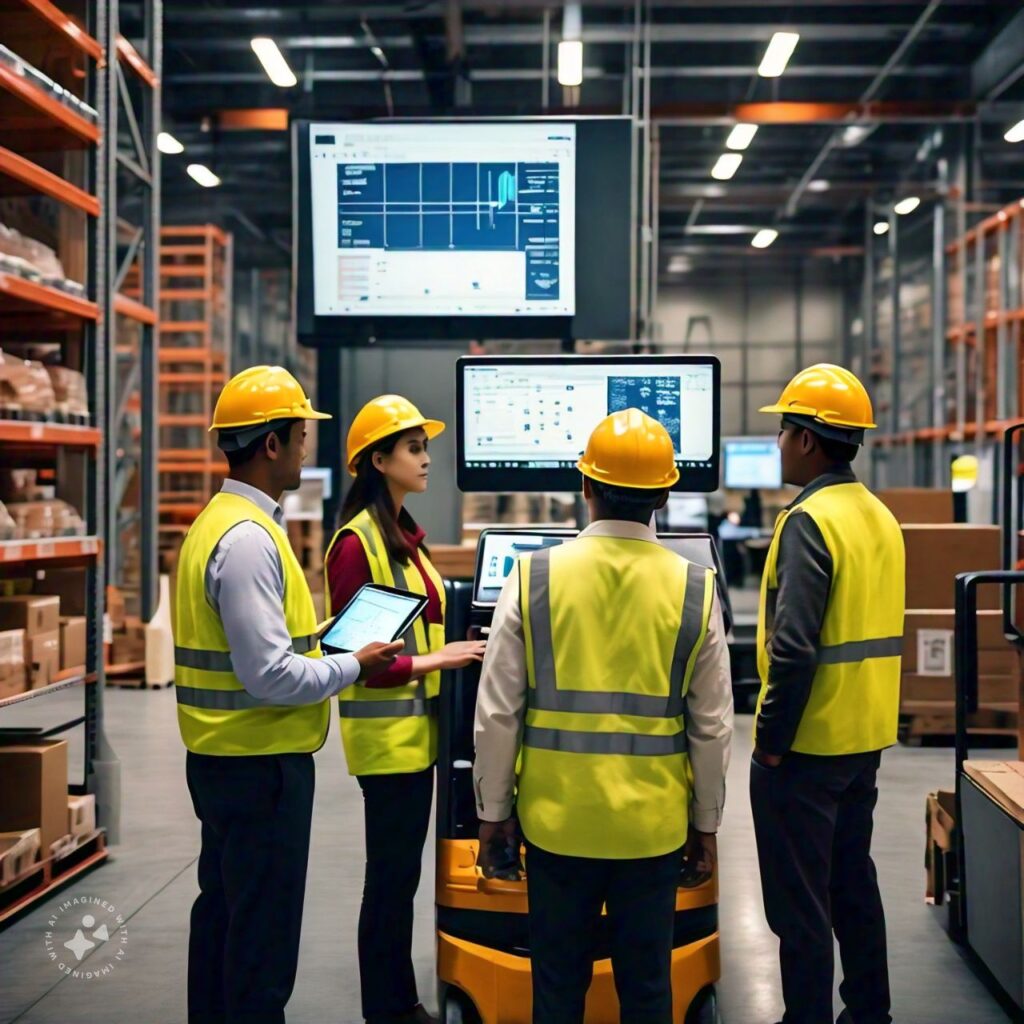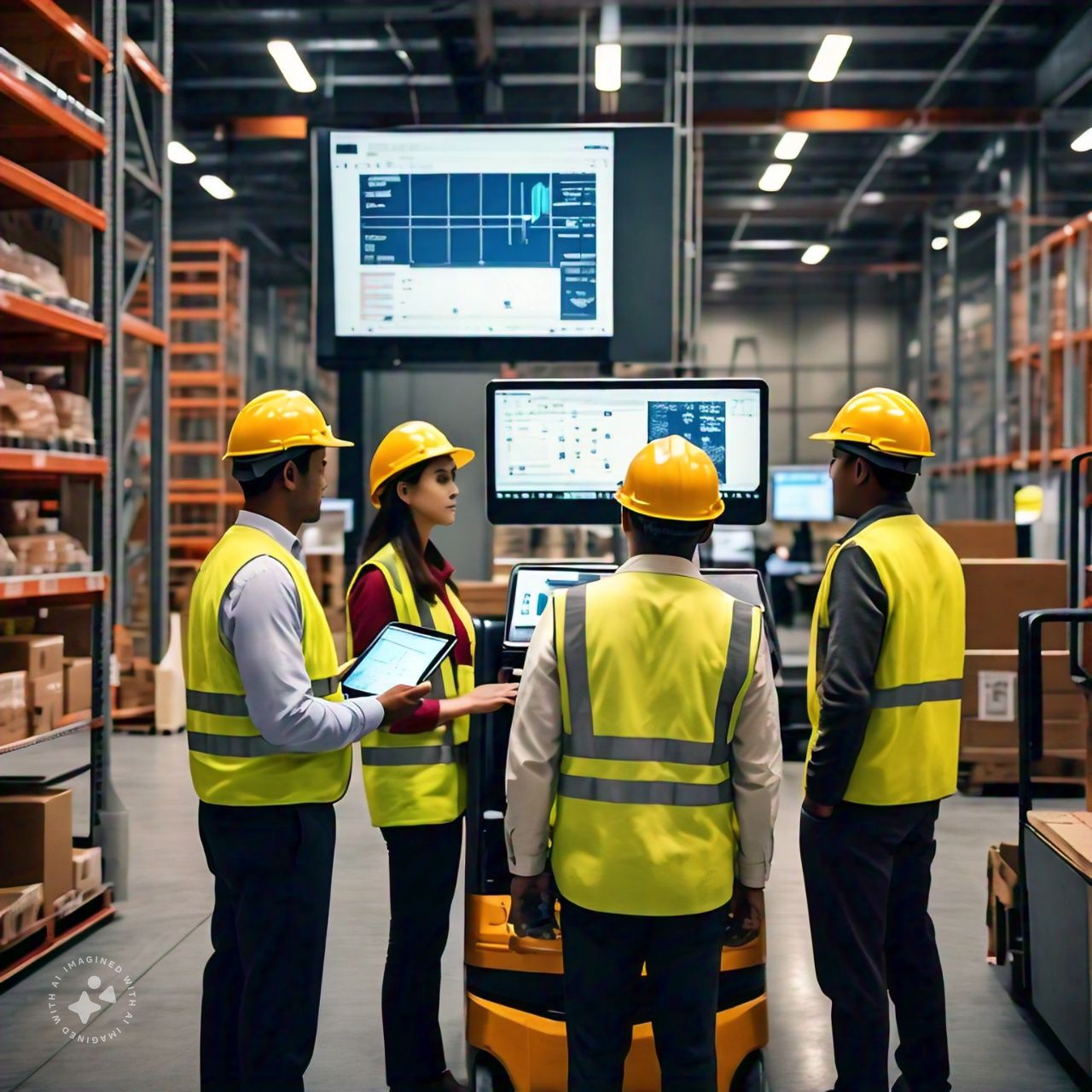AI in Supply Chain Optimization
The global supply chain is a complex network that spans manufacturers, suppliers, distributors, and retailers. Managing this intricate web has traditionally been a challenge, requiring precise coordination, forecasting, and decision-making. With the advent of Artificial Intelligence (AI), supply chain optimization has reached a new level of efficiency and agility.
AI is revolutionizing supply chains by enabling real-time decision-making, enhancing predictive capabilities, and streamlining operations. In this blog, we’ll explore how AI is reshaping supply chain management and why it’s vital for businesses to embrace this technology.(AI in Supply Chain Optimization)

Challenges in Traditional Supply Chain Management
The traditional supply chain faces numerous challenges, including:
- Demand Forecasting: Predicting customer demand accurately.
- Inventory Management: Balancing stock levels to avoid shortages or overstocking.
- Logistics Optimization: Ensuring timely and cost-effective delivery of goods.
- Risk Management: Identifying and mitigating disruptions caused by natural disasters, geopolitical issues, or market fluctuations.
These challenges are compounded by global trade complexities, unpredictable consumer behavior, and increasing competition.(AI in Supply Chain Optimization)
How AI is Revolutionizing Supply Chain Optimization
AI is transforming supply chain management by leveraging advanced analytics, machine learning, and automation to address these challenges:
1. Demand Forecasting with Precision
AI-powered algorithms analyze historical sales data, market trends, and external factors (e.g., weather, economic conditions) to predict demand accurately. This helps businesses avoid underproduction or overproduction.
- Example: Retailers use AI to anticipate seasonal spikes in demand, ensuring shelves are stocked with the right products.(AI in Supply Chain Optimization)
2. Real-Time Inventory Management
AI provides real-time visibility into inventory levels across warehouses, enabling optimal stock allocation and minimizing waste.
- Example: Automated replenishment systems powered by AI ensure critical stock levels are maintained without manual intervention.
3. Logistics and Route Optimization
AI optimizes delivery routes by analyzing traffic patterns, weather conditions, and fuel costs, ensuring goods reach their destination quickly and cost-effectively.
- Example: AI-driven logistics platforms dynamically reroute trucks during traffic delays to maintain delivery schedules.(AI in Supply Chain Optimization)
4. Risk Detection and Mitigation
AI identifies potential supply chain risks by monitoring global news, weather reports, and geopolitical data. It provides actionable insights to mitigate disruptions.
- Example: AI systems alert businesses about potential delays caused by port closures or strikes, enabling proactive measures.
5. Supplier Management
AI evaluates supplier performance based on historical data, pricing, and delivery times, helping businesses choose reliable partners and negotiate better contracts.
- Example: AI tools analyze vendor reviews and performance metrics to recommend top-tier suppliers.(AI in Supply Chain Optimization)
6. Enhancing Sustainability
AI helps companies reduce their carbon footprint by optimizing energy use, minimizing waste, and improving logistics efficiency.
- Example: AI-powered tools suggest packaging designs that reduce material usage and transportation emissions.
Applications of AI in Supply Chain Management
1. Predictive Maintenance
AI predicts equipment failures in warehouses or manufacturing units, reducing downtime and maintenance costs.
2. Warehouse Automation
AI-driven robots and automated systems enhance warehouse operations by managing inventory, picking, and packing orders.
3. Customer Insights
AI analyzes customer data to identify purchasing patterns, enabling personalized marketing and product recommendations.
4. Supply Chain Visibility
AI integrates data from various sources to provide end-to-end visibility, helping stakeholders make informed decisions.(AI in Supply Chain Optimization)
Benefits of AI in Supply Chain Optimization
- Cost Reduction: AI streamlines operations, reducing transportation, inventory, and operational costs.
- Improved Efficiency: Automated processes and real-time insights enhance overall efficiency.
- Better Decision-Making: Predictive analytics enable data-driven decisions.
- Resilience: AI helps businesses adapt to disruptions by providing actionable insights and alternative solutions.
- Sustainability: Optimized processes reduce waste and energy consumption, contributing to environmental goals.(AI in Supply Chain Optimization)
Challenges in Implementing AI in Supply Chains
- Data Quality and Integration: AI requires high-quality, integrated data from multiple sources, which can be difficult to achieve.
- High Initial Costs: Deploying AI systems involves significant investment in technology and training.
- Change Management: Employees may resist adopting new AI-driven processes.
- Cybersecurity Risks: The reliance on digital systems increases vulnerability to cyber threats.(AI in Supply Chain Optimization)
Success Stories: AI in Supply Chain Optimization
- Amazon: Uses AI for inventory management, demand forecasting, and automated warehouses, ensuring fast and accurate order fulfillment.
- DHL: Employs AI to optimize routes, reduce fuel consumption, and enhance delivery efficiency.
- Unilever: Utilizes AI to analyze consumer data and optimize production schedules, reducing lead times and waste.(AI in Supply Chain Optimization)
The Future of AI in Supply Chains
As AI technology continues to evolve, its impact on supply chain management will deepen. Key trends to watch include:
- AI-Powered Autonomous Vehicles: Revolutionizing logistics with self-driving trucks and drones.
- Blockchain Integration: Enhancing transparency and security in supply chains.
- Hyper-Personalization: AI enabling tailored supply chain strategies for individual customers.
- Collaborative AI Systems: Facilitating seamless communication between supply chain stakeholders.(AI in Supply Chain Optimization)
Conclusion
AI is no longer a futuristic concept for supply chain management—it’s a necessity in today’s competitive and fast-paced world. By leveraging AI, businesses can enhance efficiency, reduce costs, and build resilient, sustainable supply chains.
However, implementing AI requires strategic planning, investment, and a willingness to adapt to new technologies. For businesses looking to stay ahead of the curve, embracing AI in supply chain management is the key to success.(AI in Supply Chain Optimization)
Social Media handles (Facebook, Linkedin, Twitter
Go to our Website for News and Articles: https://informtoyou.com/



